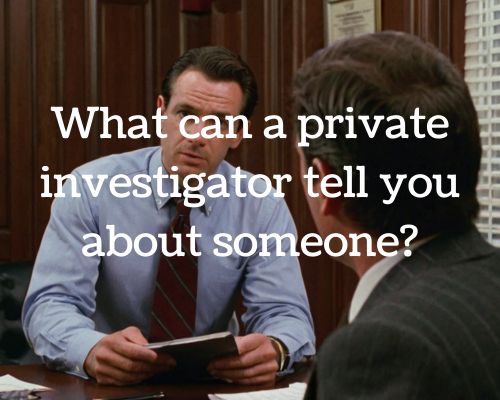What Can a Private Investigator Tell You About Someone?

Key Insights Revealed
Hiring a private investigator like Private Investigator West Palm, can unveil a wealth of information about someone, covering aspects you might not have considered.
A licensed private investigator can tell you about someone’s criminal record, financial history, and personal background, all within the bounds of the law.
They can use surveillance to observe activities and interactions, providing insights into daily routines and associations.

Private investigators also gather information from various public records and databases, revealing details such as employment history, marital status, and property ownership.
They follow strict legal and privacy guidelines to ensure the information collected is ethical and admissible in court if needed.
When you hire a professional, you gain access to a network of resources and expertise that goes beyond what you can uncover on your own. Whether you’re dealing with a personal matter or a business concern, a private investigator can be an invaluable asset.
Capabilities and Legal Boundaries of a Private Investigator
Licensed private investigators possess specialized abilities to gather information while adhering to legal and ethical standards.
Their work requires a fine balance between effective investigation and respecting boundaries set by laws to protect privacy.
Access to Public Records and Private Information
Private investigators can access a wide range of public records to gather information.
These include court documents, criminal records, and public databases. Financial information may also be available through legal means, but access to secure data such as credit reports generally requires consent or a legal basis.
They must navigate privacy laws to avoid misuse of private and protected information.
Accessing such data without proper authorization can lead to severe legal consequences, including fines and jail time. Staying updated on state and federal privacy laws ensures they operate within legal constraints.
Surveillance Techniques and Privacy Considerations
Conducting surveillance is a common task for private investigators, but it involves adhering to strict privacy considerations.
They can monitor from public property but must avoid trespassing on private property. Using GPS tracking devices typically requires consent, and wiretapping without judicial approval is banned under federal laws.
Different states have varying laws about recording conversations.
Some states follow two-party consent laws, necessitating all parties’ approval. Others follow one-party consent rules, allowing recording with the permission of just one participant.
Understanding and compliance with these laws are critical to avoid legal repercussions and respect individuals’ right to privacy.
Common Misconceptions About Private Investigative Work
There are many misconceptions about what private investigators can and cannot do. A clearer understanding of their limitations and ethical boundaries is crucial. Let have an understanding on it with Charles Jimerson of Private Investigator West Palm.
What Private Investigators Cannot Do
Private investigators must abide by strict legal restrictions.
They cannot impersonate police or law enforcement officers. They do not possess the authority to make arrests. Only local law enforcement and federal government agents have this power.
Further, private investigators cannot wiretap phones without consent. Unauthorized wiretapping is illegal and punishable under federal and state laws.
They also cannot hack into email or social media accounts or access accounts without consent. Doing so would be a violation of privacy laws.
Trespassing on private property is another activity outside the bounds of legitimate investigative work.
Private investigators must respect property laws and cannot enter someone’s home or business without permission.
Ethical and Unethical Practices
Ethical investigators follow the law and protect the privacy rights of individuals. They gather information through legal means. These include public records, interviews, and surveillance in public places. These practices ensure their findings can be trusted and used in legal proceedings.
Unethical practices, such as harassment or stalking, are unequivocally prohibited. A licensed PI must avoid behavior that could be perceived as invasive or threatening. Engaging in actions like placing unauthorized wiretaps or hacking is both illegal and unethical.
Private investigators should exercise caution and adhere to a code of ethics that upholds the integrity of their profession. Ensuring that your investigator follows ethical guidelines protects both your interests and those of the subjects investigated.

